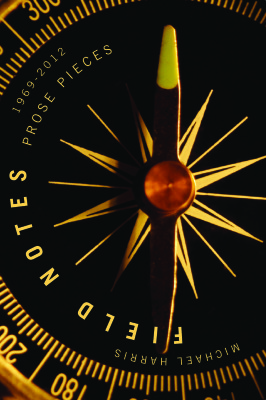Michael Harris’s Field Notes: Prose Pieces 1969–2012 begins with the story of an ill-fated trip to the Hamptons where “a well-intentioned and fastidious cleaning-person” discarded ten years of his writing. Two books of poetry and over four hundred pages of prose by the Montreal writer, editor, and teacher were consigned “to the keening attention of the seagulls circling above the local Long Island landfill.” Harris blames this volume’s tardiness on that loss; much of the work was recreated from memory and alternate drafts. And while Field Notes is filled with interesting and introspective moments from Harris’s career in letters, it does feel as if something was lost to the gulls that fateful afternoon on Long Island.
The first section of Field Notes is made up of a collection of essays, prose, and an interview with Leonard Cohen. It is a compelling and thoughtful consideration of Harris’s mortality, something the writer is keenly aware of. His subjects are mostly dead or dying. All hold some place of prominence in the canon of their discipline, but there’s a tangible absence in some these pieces – colleagues, friends, family, all are missing names and specificity. It’s as if only Harris and the canonical (Irving Layton, Jorge Luis Borges, Ted Hughes, Leonard Cohen) exist, and the rest of the world is mere detail. In this we find a fascinating illustration of a writer trying to place himself within the history of his form. Harris masters the unique ability to be both conceited and humble, a quality that makes for the best of writers.
It is in the interview with Cohen that Field Notes finds its most vibrant and revealing passages. First published in 1969, the document is a conversation between two confident young men who simultaneously show each other respect and indifference, a fine balance between cool and honest, two cocks strutting the coop:
Harris: Do you have, or did you have, a magic age when this coming of age happens?
Cohen: I feel I’m on the edge of it.
Harris: Have you always been on the edge of it?
Cohen: Sometimes I’ve been in it, sometimes I’ve been past it.
Harris: When were you past it?
Cohen: Around the time the record was being made I had very unclear ideas of almost anything.
Harris: Do you call this despair? Cohen: It’s one of the things I call it.

Field Notes
Prose Pieces 1969–2012
Michael Harris
Signal Editions
$18.00
paper
160pp
9781550653502
When asked in a 1997 interview by Carmine Starnino, included in the collection, about what is at the root of his work, Harris replies, “Mortality— and the quality of joy that comes from having to come to terms with mortality.” That consideration of mortality propels the collection’s first half but is tangibly absent from its second. Field Notes are exactly that; an accumulation of marginalia that provides a keen glimpse into the writer’s process. Harris has provided a collection of texts that tease a compelling memoir about a half-century of writing in Canada’s most diverse and dynamic city. mRb






0 Comments